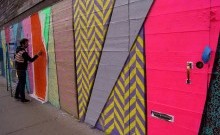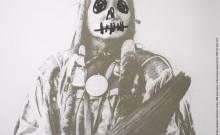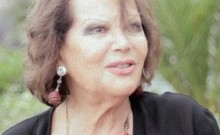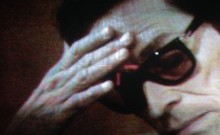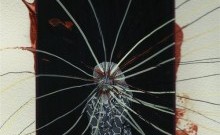Rumblin’ on the Edge of Pontomic with Tayarisha Poe
Hard at work on her feature film debut “Selah & the Spades,” a metaphysical coming of age tale of a high school game in a fictional Southern Pennsylvanian town, the West Philadelphia born & raised Tayarisha Poe has in short order amassed a prolific mass of image based work, be it in the form of short films, commercial & music videos, photography, or new media. Amidst striking portraits of Philadelphia teenagers & their families a narrative emerges slowly of youth, their struggle to find happiness, & the transition into adulthood. Recently chosen as one of Filmmaker Magazine’s 25 New Faces of 2015, Tayarisha stopped by 1985 to chat about her ongoing narrative pursuits, how sometimes a story has to be told in stills, & the late, legendary Chris Marker.

Evan Louison: You speak about your work being subjectively devoted to “girls of color who are unapologetic in their volume, or their attitude. Who seek not make themselves easier to understand, because they already understand themselves, and do not consider it their job to teach others to understand them.” Do you come from a big family of women? What was it in your own upbringing that brought this theme to the forefront of your work?
Tayarisha Poe: No, not really — a lot of brothers. But my mom & I were probably the loudest voices around. I was definitely the loudest & the angriest, & never felt silenced for being a girl. My parents would never allow that, & my brothers never made me feel that way. It all feels so normal to me. I used to work at a Summer Camp, & I used to love to sit & listen to the 12 year old girls sit & ramble on about their days. I understood the feelings, how scary it all was, that this was the first time they had had a crush on someone — & it makes me so mad to think of all the people who have made young girls feel like they have to apologize for what they’re thinking, what they’re experiencing, because it’s silly, it’s not important — we apologize for having feelings, & I never want anyone to watch any of my work & apologize for understanding those feelings. How could I not do that? I don’t think anyone should.
EL: You say in one piece, “I think the world is composed of narratives. And that’s what people are more than anything — narratives.” In the case of Selah & the Spades, we’ve been interested in this work for a while. It’s prolific & hyper focused on youth. The sheer amount of work is impressive, to say the least.
TP: When I first got the idea for Selah, I just found myself really annoyed with adulthood, being an adult, having a job, being under fluorescent lights & normal adult stuff like that, & started thinking about what I would do if I could do anything. And then I thought of people who do what they want to do no matter what. And that led me to the idea of this person who did “bad” or questionable things & never concerned herself with the consequences. That was the first thought — someone who wasn’t concerned with that for herself, but thought she was fit to dole out consequences for all others — a sort of human, god-like figure. The next thought I had was that she had to be a teenager. And I think the reason I felt that way was that I’ve always thought, since I was a teenager, which wasn’t that long ago, that being a teenager is the first time you’re experiencing so many of the things — being 25 now, if I fall in love with someone, if I get into a huge fight with a friend, that’s not the first time that’s happened — it’s great, it’s still potent, & very real, but no matter what — it’s not the first time. Teenagers are just figuring out that things end, that nothing is forever. At least when I was a teenager, there’s this knowledge that people die & things end, but that’s not gonna happen to me. I won’t die. Things won’t end for me. I’m still kind of invincible. So there’s this knowledge of immortality, this feeling of being invincible — you’re young, you’re strong. You have to feel more than human. It’s so often that we brush aside the drama of being a teenager, the hyper-emotional moments of teenage years, & write it off as pubescent or hormonal — & I don’t feel like it gets the respect that it deserves, going through those changes, the conflict of realizing that you’re not immortal — everything is always forever. And I like working with teenagers because they really do have to balance adulthood & maturity & they’re still just kids.

EL: What was your relationship to cinema growing up?
TP: I used to hate movies. I read a lot of books. I was pretentious when I was 16, just like when I was 8. I was convinced that a book was the best expression of a story you could have, & in a lot of ways nothing is better than reading. But my family was always really into movies. Even now if I went to my parents’ house, chances are we would watch something together. Even just in the background, there was always something on. So I grew up around them. Even if it took me longer to grow to love them.
EL: What was the start of your process as a filmmaker?
TP: The first time I thought about making films was in high school, but I always wanted to be a writer. I always wrote stories, when I was a kid, but in high school I took Video 1, & I had to make a self-portrait with in camera edits — we had these old VHS cameras. I went to boarding school where you would have a study hall at night & then could go out for an hour before curfew. I remember sitting on these two benches with my roommate, filming her for my self-portrait. And something about the nighttime, the lamplight overhead, & sitting with my good friend made that the first time I ever thought that maybe making movies could be a good thing. And I’ve been doing it since then.
EL: A lot of people have their formative cinematic experiences in those remedial art classes. Did you have to edit on VHS?
TP: No we had computers.
EL: When we learned it was still analog — VHS to VHS. It was more physical — the toggles were the size of sand dollars. It was like a video game.
TP: We were lucky at my school.
EL: You knew what you wanted to do when you were at Swarthmore?
TP: I went in thinking I wanted to study sociology & anthropology. I was interested in culture. I took an Intro to Film class there, & if I remember correctly, received the lowest possible grade to pass, even though the class was pass fail. I remember arguing that it should be okay to not like Citizen Kane, probably just cause I was sick of having to watch it, they show it in every Film course. That’s what I took away from the class, so I didn’t think I wanted to be a filmmaker. (laughs)
EL: That’s kind of an inauspicious beginning in the Film Department.
TP: I wanted to write, but the English Dept at Swarthmore was just based around Dead White Men. So then I started going back into film, & took all the production classes they had to offer, & that really changed things, being able to create stuff. It’s not all good memories. In the Film Department, there’s a lot of really smart people there. But I honestly think High School was for me, more important to developing my interests. Something about that particular boarding school at that particular time in my life. Academic experiences as far they relate to what I do now? High School hands down, really shaped my work.
EL: At very least your aesthetic sensibilities were probably starting to form there. You were figuring out, slowly, what you “like.”
TP: I always think it’s interesting when you can know something’s right, that something about a practice draws you to it, & you don’t have knowledge of why because you’re not aware of it. Maybe the reason it was so formative was because I was in a community where I was away from home, so we were all pseudo-adults cause we’re away from home, but you’re still fucking children. I don’t think it’s a good idea, I think people need families. I think we’re pushed into early adulthood, & the responsibilities are really weird.
EL: Any changes in your sensibilities?
TP: I really like Orson Welles now. I still think Citizen Kane is boring, but I really like some of his other films now.
EL: Were you producing stuff while you were in school?
TP: Oh yeah.
EL: Is there a curve to where you are now in your process or do you still show stuff from then?
TP: My documentary stuff, yeah. I did a lot of stuff with my brother’s dance team that was really good. Documentary is different because so much depends on exactly what is in front of you at any one time. In fiction I can change things. But with a doc it’s about capturing who’s there in front of you.
EL: Where are you in the process of Selah? You were planning on shooting this summer & have been creating a visual narrative (as well as a picture book like children’s story) around the characters for some time.
TP: It started as a short story I wrote in 2012. I turned the short into a script about Selah & Maxi. Selah was this girl who ran a gang called The Spades in a small, southeastern Pennsylvania town called Pontomic — which is totally fake, & completely based on Philadelphia, where I’m from. No one knew she was the head of The Spades, they all thought it was Maxi, he’s the sort of “public front” of the gang. Sundance was doing these screenwriting intensives in Miami & Phiadelphia, & the Selah script got into the one in Philly. So I workshopped it there, & then I didn’t really know what to do with it, so I decided I would write for a while & turn it into a feature. My goal was just to write a scene a day, & then at the end of a month I had at least 30 vignettes. Just prose, short, short stories. I wanted to see it off of the page, so I put out a call for actors. Got tons of emails from all around the East Coast, & I only responded to one, & that was Angela [Bey], who plays Selah. We met at this cafe, & she was in dress rehearsals for her high school musical version of Rent, & she was all decked out in makeup & done up in this way that you don’t normally see somebody for an audition — And I was just like, this is exactly what I was thinking. So we took a bunch of pictures based around the vignettes, & I applied for a grant from the Leeway Foundation in Philly to shoot what is now called as Selah & the Spades : Overture. And that’s out in the world, people have seen it, we’ve gotten good feedback. And it’s 12 or 13 chapters from some of my favorite vignettes —- prose, short stories, series of photos, songs I found on the internet, & these short filmed scenes. The way it’s structured is less chronologically & more from feeling to feeling, tone to tone — so it’s arranged more like a mix-tape than an album. And it’s almost completely from Selah's perspective. I like to say that the overture is how Selah sees herself, sees the world. And that’s important cause in the feature, the whole story is told from the perspective of a girl, Poloma, who’s an underclassman & Selah is training her to take over The Spades after she graduates. So you get a lot of Selah from the point of view of a younger person just swept up in the drama of The Spades, & The Spirit Squad, & all these other things Selah is known for.
EL: It stands on its own as well. Do you feel like making things that travels between those different forms/disciplines, & outside of the bounds of “cinema” is a path you’ll continue? If it wasn’t getting the traction it felt like it deserved in terms of funding, you could always develop it more in this direction. There is something almost akin to Chris Marker in this completely subjective, at times opaque visual play. Is he someone you were aware of in your studies?
TP: Yeah he was a huge inspiration for me.
EL: You have the gift to make work that’s visually arresting & engaging on that level regardless if it’s in the theatre.
TP: Without a doubt, & I’m so glad you asked me about that, cause no one else does. La Jetee is something I watched back in Video 1. That’s why I got into photography. It’s still amazing. There’s still nothing even anything really comparable.
EL: Your work Outskirts from a few years ago is one example where you have a sort of picaresque visual narrative being created with interstitial imagery of a young woman, almost at all times as the main focus. What kind of filmmaking has helped to bring you closer to your own vision? We spotted an image from Just Another Girl on the IRT in your lookbook.
TP: This fictional town is one that I’ve been writing about for a while. A lot of the characters cross over between these different stories — it’s almost like writing fan fiction for myself. The first time I was working on the Overture, I was talking to Terrence [Nance, dir. The Oversimplification of Her Beauty], my producer, I told him it would be really great if we could devise a sort of mailing list wherein people would receive one little chapter in the story at a time, over a long period of time. But I still like going to the movies — I like to sit right in the front row, even though I know it’s not where you’re supposed to sit — I just really like to be engulfed by the story. But I also don’t like how, because I live in Philadelphia, it’s really hard to see a lot of movies that aren’t big Hollywood things. And I want people who don’t live in New York to be able to see it.
EL: So your work is about connecting, not necessarily about cinema. Cinema might not be the best platform for your work.
TP: Probably not. Probably not a theatrical release — I think people watch things at home most often anyway. We’re still pretty stuck to the idea that “this is cinema — this is what it is, this is how it’s shown, you shoot it this way — & we’re stuck this way.” And that’s fine. I can play that game. I can make a feature that will play in theaters. But I want to do this so that my next project, which is probably gonna be another story from this same fictional place, then I can go back & do whatever I want with it. Cause I honestly feel like everything started out being written as prose, & when I read it, it just felt like a film. It felt like it had to be moving & breathing. Some stories are just meant to be told with photos & text. You shouldn’t see the movement. You should see it in your head first.
EL: When filmmakers use stills in their work, it’s considered largely to be a jarring, disruptive thing. In narrative work. But when you switch tracts to documentary work, it’s a commonplace.
TP: I hate that. Even now, when you look at grants for Trans-media stuff, it’s almost always documentaries. Which is so frustrating.
EL: Fine Arts funding is unfortunately predisposed to that field.
TP: Well they think you can always make money with narrative film.
EL: You think you’re gonna shoot it slowly & develop it over time?
TP: I think it will be easier to have a proper production period. But our two main characters are both still in High School, so scheduling is very difficult. Money’s the first biggest struggle, with scheduling the second. But they’re people, & they’re young people. And they’re good performers, so I like to see what they can come up with before I tell them anything. Sometimes they understand it better than I do. If it feels more natural to me, I like to defer to them. Some scenes have more written, others have more room than others. Some stuff comes from our rehearsal periods, where they improvised things, things that are now a reality in the story. One thing I knew was that if I was gonna make my first feature, it wasn’t going to be this floaty, introspective thing — it would have to have surrealist elements to it, as they are attached to certain characters. Paloma is swept up into this High School gang life, a colorful world, through a very dream-like perspective. It’s almost like everything she experiences exists at a whole different speed, like a different frame-rate. I’m really excited to see what it’s going to look like.
Portraits of Tayarisha Poe by Daniele Sarti | @danielesarti









